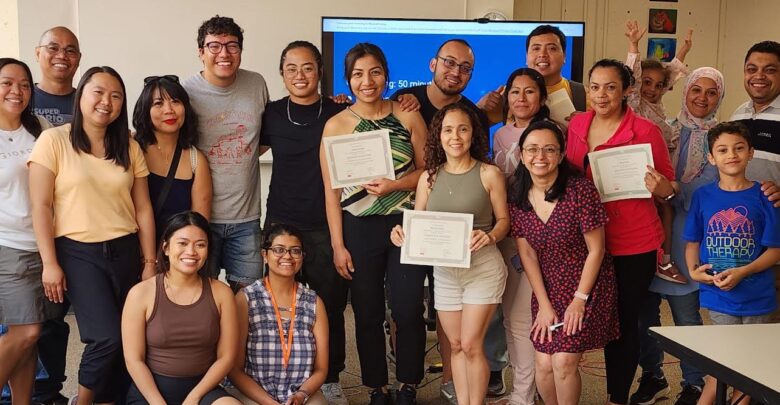Humans of UAlberta: Nirupama Rajan
“I think at some point you start seeing that it's inevitable to see the connections between one form of injustice and other forms of injustice,” Rajan says.
 Supplied
Supplied Nirupama Rajan has pursued activism ever since she became involved with environmental activism in high school. Her focus centered on gendered migrant activism in Canada after her studies at the University of Alberta.
Rajan is a research assistant for professor Susanne Luhmann in the U of A’s department of women and gender studies. She graduated in January with a Master’s of Arts in Gender and Social Studies. Her thesis explored how immigrant women from Southeast Asia or Africa experience and respond to intimate partner violence compared to women in Canada. But throughout her academic career, Rajan transitioned between multiple different activism streams.
Shifting from environmental to social activism
Rajan transitioned from a science, technology, engineering, and mathematics (STEM) focused academic career to one in the humanities. This happened because of a funded volunteer program in Germany where she did a mix of environmental and social activism.
During a six-hour-long seminar on gender activism by a student from the University of Leipzig, Rajan, who was then a recent undergraduate, decided she was going to pursue gender studies full-time.
Having done her schooling in India, Rajan faced expectations to pursue a STEM-related field because she was doing well academically.
“I think [it’s a] global thing where the sciences are considered in some way more virtuous than the humanities. If you do well in India you’re just expected to pick the sciences. I picked the sciences [and] had an absolutely horrible time. It wasn’t anything that I was remotely interested in,” Rajan said.
Rajan started off with environmental activism in India at the rural and urban levels. Rurally, she helped build watersheds and rainwater harvesting systems. At the urban level, she interacted with the government to achieve actions at a larger scale.
“I think at some point you start seeing inevitable connections between one form of injustice and other forms of injustice. What started off as environmental activism very organically became social activism,” Rajan said.
“Women from different cultures experience partner violence in very different ways,” Rajan says
After her abroad program in Germany, she started working at an organization focused on women’s rights in Bangalore, India. She was primarily involved with providing interventions in domestic violence cases.
“We formed connections so that women could just come to us and we would take it from there. We also had lawyers [and police] who worked with us. So much of domestic violence, and particularly so in India, is undisclosed. Women don’t go to the police and even if they do they are uncomfortable. The police would refer them to us instead,” Rajan said.
During her research assistantship with U of A professor Philomina Okeke-Ihejirika, Rajan worked on a project focused on partner violence in Black immigrant communities in Alberta. Here she saw the differences between cultures and intimate partner violence.
“[In] a lot of cultures, the language for intimate partner violence is different or does not exist. If the language for something does not exist, how do you perceive it? Intimate partner violence is a very defined social legal construct [in Canada]. A lot of people don’t fall within that box,” Rajan said.
“For an immigrant from a country like India, there’s a lot of cultural context that immigration itself has. There’s a lot of stigma associated with a woman who returns to the country without her husband. That kind of stigma is not acknowledged or accounted for in the sort of solutions that are offered to immigrant women [in Canada] who are suffering domestic violence,” Rajan added.
Rajan is now working for Migrante Alberta to support temporary foreign workers in Canada
Currently, Rajan is working for Migrante Alberta as a co-ordinator for the temporary foreign worker outreach program. Migrante Alberta is partnered with the federal government and organizations across the prairie provinces. It forms connections and networks to offer support and services to temporary foreign workers.
Some of the work it conducts includes offering free English classes for foreign workers who want to qualify for permanent residency (PR) in Canada.
“[Temporary foreign workers] have been living in this country for so many years, which is what allows them to qualify for PR. But they still have to show their proficiency in writing essays,” Rajan said.
“We’re doing some campaigns to do away with that testing altogether but at the same time, we offer free classes for migrant workers. [Otherwise, they would] have to pay to get trained to write that exam. It is a money-making scheme.”
Although Rajan is currently focused on her work for Migrante Alberta, she said injustice issues are all intertwined. She also highlighted how everyone is complicit in some form of injustice.
“In this social media-directed world, there’s no room to be in the wrong. No room to mess up. I think accepting that and still trying to do the work — that’s the only thing that’s going to move us forward.”




